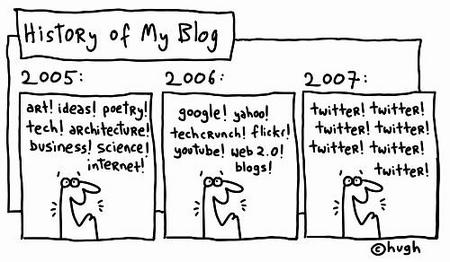| Blogging/Microblogging and work | 2009-06-11 18:53 5 comments |
 by Flemming Funch by Flemming FunchI suppose that one of the reasons that I and many other people don't blog as much as they used to is that we're microblogging. "Microbloging" is one of the words for what you do on Twitter or Facebook. Instead of attempting to write articles, one does little one-liners to answer the question "What are you doing?", preferably a number of times during the day. You can squeeze quite a bit into 140 characters, and it inspires people to be more clear and succinct. It might inspire people to be mindful of what they actually are doing, what they feel, what they actually have to say. Then again, it might make others go on an on about nothing much. A lot of my friends in social networks are some kind of tech gurus. People who'd speak at tech conferences. Many of them are talking a lot about twitter. How it somehow is an answer to everything, replacing blogs, bookmarks, search engines, forums, etc. And I think it is cool too. It is just not quite there yet. You can't have much of a conversation on twitter. And you can't really talk about what you're really doing. Nobody's working on twitter, for one thing. Oh, people are flying around, meeting interesting people, speaking at conferences, etc. Which for some people is some kind of work. But what's missing is all the detail, what's actually going on, how you actually do it, who pays for it, etc. Both blogging and microblogging are mainly for show. Microblogging feels a bit more real, more real time, more honest. But it still has to adhere to a certain agreed format, which doesn't leave room for more than the highlights. Most of what we'd call "work" involves a certain intensity and volume and a certain persistence. You stay with something until you've gotten some kind of result. That takes whatever it takes, maybe trial and error, maybe a certain amount of time, certainly a certain series of actions. The log of what you actually did would be quite voluminous. You could have a meeting in an instant messenger or twitter format. Or you could have a meeting in the comments of a blog. I mean a meeting where there's something you need to decide or plan or solve. That could easily be a hundred messages exchanged between the people who're involved. But nobody would have the patience for listening to that on twitter, unless they were part of the same project. Too much, too boring, too revealing. Which is why nobody shares much of what they really do, other than markers. "I arrived in New York", "I'm going to the Google board meeting", "There's a fly in my coffee". We get a sense of what kind of stuff this person is up to, and a sense of who they are. But no sense of what they actually do that's working. OK, I have a bit of the same problem with people in the real world: that it usually is a well guarded secret what they really do. But that's a different discussion. My point here was more about the search for a format for online interaction that both allows a peripheral awareness of what many people are up to, and that also allows more intensive activity to happen, without having to "go somewhere else" and do it. Maybe Google Wave? |